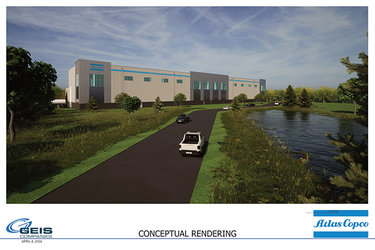Atlas Copco looks to expand
— From Atlas Copco submittal to the village of Voorheesville
Atlas Copco in Voorheesville manufactures centrifugal compressors used in major industrial plants. But due to space constraints, the company has been unable to make even larger compressors that have become an essential part of the carbon capture and sequestration sector in American manufacturing.
VOORHEESVILLE — Atlas Copco, a village mainstay for four decades, is looking to increase its compressor operations in America by proposing a $30- to $40-million expansion of its School Road facility.
The plant, which is operated by a limited liability company of the multinational conglomerate, Atlas Copco Comptec, manufactures centrifugal compressors used in major industrial plants.
But due to space constraints in Voorheesville, Atlas Copco has been unable to make larger compressors — instead, it has had to import them from its plants in Germany and China — which have become an essential part of the burgeoning greenhouse-gas-emission-reducing, carbon-capture and sequestration sector in American manufacturing,
To overcome these logistical challenges, Atlas Copco is seeking permission to build a six-story, 63,000-square-f00t addition to its current 101,000-square-foot facility.
The project would need multiple variances from the village, for height and area.
The facility’s proposed 60-foot height is needed for the type of cranes used in manufacturing Atlas Copco’s compressors, but village code allows buildings to be a maximum of only 40 feet. The second variance is needed because a building’s total footprint is allowed to be only 20,000 square feet; with the addition, the facility would be a total of about 165,500 square feet.
“If we do this, this facility will be the only facility in the United States currently capable of manufacturing and testing CO2 compressors,” Randy Dirlam, Atlas Copco’s Voorheesville general manager, told members of the village planning commission on April 9, adding, “Nobody else makes them here.”
Dirlam said the expansion would allow Atlas Copco to hire another 50 workers; the company currently employs about 300 in Voorheesville, he said.
With its proposed expansion, Atlas Copco is looking to fill a void in the decarbonization marketplace.
The company’s compressors are used in the carbon-capture and sequestration (CSS) processes employed by American industries such as ethanol production, cement manufacturing, and power generation. With CSS, these industries are able to reduce climate-changing greenhouse gasses by capturing the carbon dioxide emissions and permanently storing it underground.
But the growth of the CCS industry has been hampered by a lack of domestic manufacturing capacity, particularly when it comes to the type of large-scale compressors made by Atlas Copco, which aims to fill the manufacturing gap with its Voorheesville expansion.
“In the decarbonization, carbon capture, and carbon sequestration markets, these are brand new. They didn’t exist 10 years ago. They didn’t really exist five years ago except in some pilot plants. Now it’s a full-blown industry across the heartlands where ethanol was made," Dirlam told commission members.
He also said Atlas Copco’s plans had been buoyed by government largesse.
Recently, he said, the company was notified of a successful application submitted to the Department of Energy for tax credits related to clean energy manufacturing, which were made possible by passage of the Inflation Reduction Act of 2022.
“On March 29, last Wednesday, we were approved for a tax incentive as part of the IRA, the Inflation Reduction Act,” Dirlam told planning commission members on April 9. “Section 48C of the IRA allows us to have tax credits of 30 percent of our investment for 10 years. So this $30- to $40-million, we’ll get 30 percent of that back in tax credits per year for 10 years.”
Potential issues with additional truck traffic, increased building height, and nearby wetlands were all acknowledged by Atlas Copco, which said it would work with residents and the village to address those concerns.
But it was the complaint most associated with Atlas Copco that its representatives sought to get out in front of.
“It always comes up: noise, right?” Dirlam said. “So I’m surprised nobody has asked that yet, so I’ll bring it up.”
Dirlam said testing of the larger compressors will be performed in Atlas Copco’s current testing building, but, because of their size, they are subject to a different type of testing, which means there shouldn’t be any additional impact on nearby residents.
“But knock on wood,” Dirlam said. “We haven’t had a noise complaint in four or five years now.”


